 2023-2024 Stanford Distinguished Professors
2023-2024 Stanford Distinguished Professors
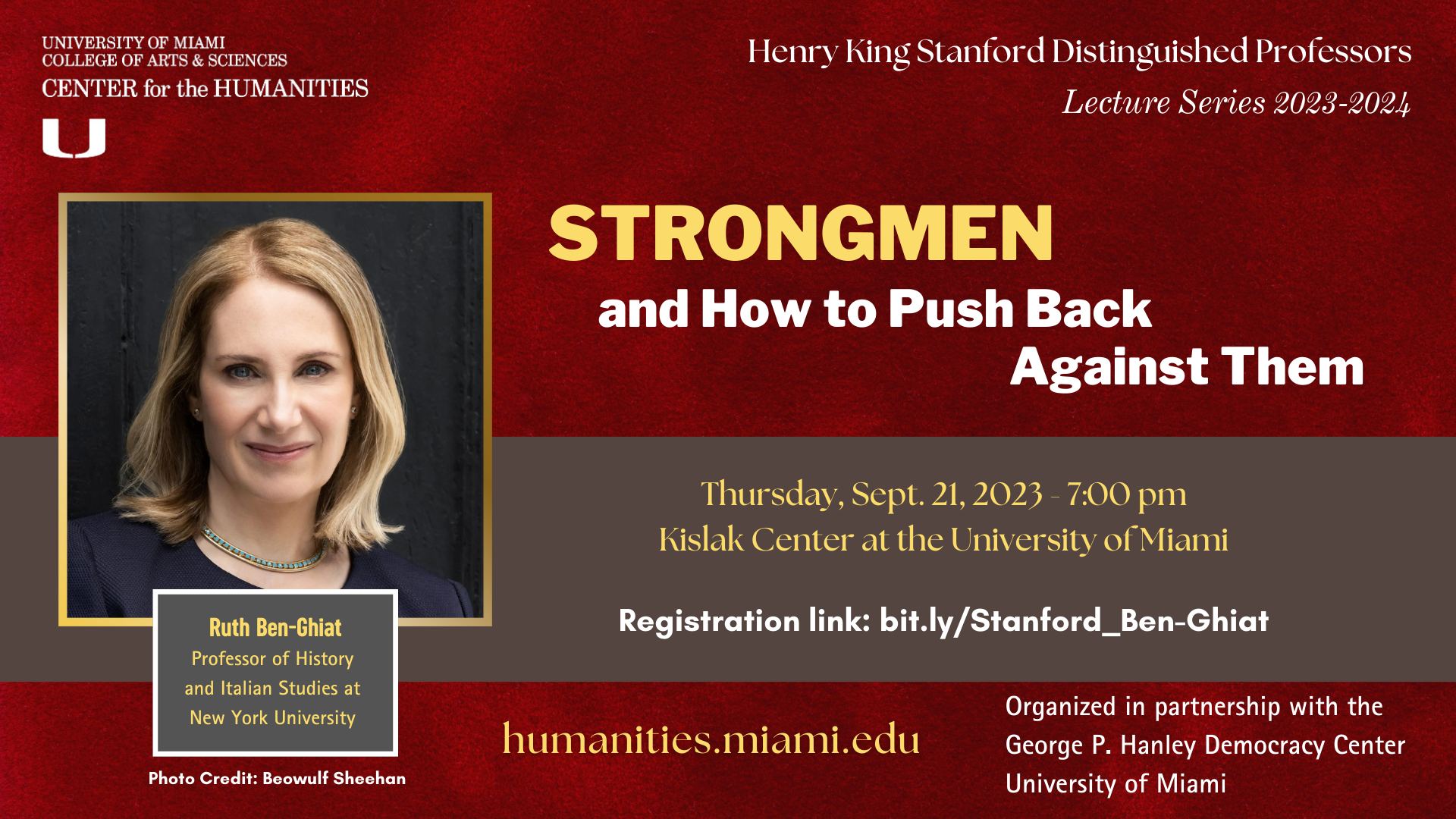
Thursday, September 21 @ 7:00 pm
Kislak Center at the University of Miami
Ruth Ben-Ghiat: "Strongmen and How to Push Back Against Them"
 to view the recording of this Stanford Lecture with Ruth Ben-Ghiat!
to view the recording of this Stanford Lecture with Ruth Ben-Ghiat!
The Center for the Humanities is inviting you to join us for the first Henry King Stanford Distinguished Professors Lecture of the year with Ruth Ben-Ghiat, Professor of History and Italian Studies at New York University. She is an MSNBC Opinion Columnist and commentator on CNN, MSNBC, and other media outlets about authoritarianism, Fascism, and threats to democracy around the world.
Authoritarianism is spreading across the globe, and Ben-Ghiat argues that the United States has become the latest front of the struggle between autocracy and democracy. This talk covers the key elements of the authoritarian playbook—corruption, violence, propaganda, machismo, and leader cults—and how they are deployed today by autocratic forces in Italy, Hungary, the US, and elsewhere.
Ben-Ghiat also looks at the most effective strategies to push back against authoritarians. We are living through a global renaissance of mass nonviolent protest which is giving energy to the fight to save democracy. We in the US can learn from the struggles of those facing autocrats abroad, she argues. We can not just save our democracy but rethink it to make it stronger and more appealing to future generations as well.
Organized in partnership with the George P. Hanley Democracy Center.

Ruth Ben-Ghiat is Professor of History and Italian Studies at New York University. She is an MSNBC Opinion Columnist and commentator on CNN, MSNBC, and other media outlets about authoritarianism, Fascism, and threats to democracy around the world.
Her latest book, Strongmen: From Mussolini to the Present (W.W. Norton & Company) examines how illiberal leaders use corruption, violence, propaganda, and machismo to stay in power, and how resistance to them has unfolded over a century.
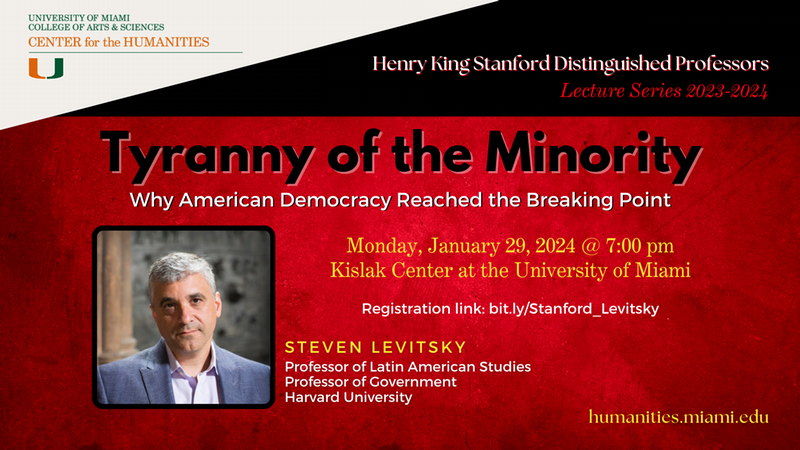
Monday, January 29, 2024 @ 7:00 pm
Kislak Center at University of Miami
Steven Levitsky: "Tyranny of the Minority: Why American Democracy Reached the Breaking Point"
 to view the recording of this Stanford Lecture with Steven Levitsky!
to view the recording of this Stanford Lecture with Steven Levitsky!
The Center for the Humanities is inviting you to join us for this Henry King Stanford Distinguished Professors Lecture with Steven Levitsky, Professor of Government at Harvard University.
America is undergoing a massive experiment: It is moving, in fits and starts, toward a multiracial democracy, something few societies have ever done. But the prospect of change has sparked an authoritarian backlash that threatens the very foundations of our political system. Why is democracy under assault here, and not in other wealthy, diversifying nations? And what can we do to save it? In this talk, based on his new best-selling book with Daniel Ziblatt, Steven Levitsky will offer a framework for understanding these volatile times, and an urgent call to reform our politics in ways that protect and nourish our democracy. 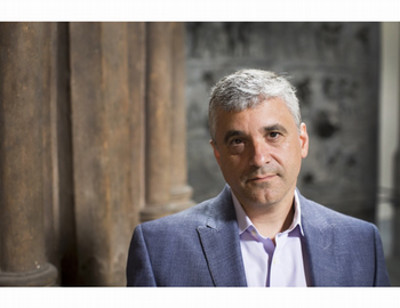
Steven Levitsky is David Rockefeller Professor of Latin American Studies and Professor of Government at Harvard University. He is also Director of the David Rockefeller Center for Latin American Studies at Harvard. His research focuses on democratization and authoritarianism, political parties, and weak and informal institutions, with a focus on in Latin America. He is co-author (with Daniel Ziblatt) of How Democracies Die (Crown, 2018), which was a New York Times Best-Seller and was published in 25 languages. He has written or edited 11 other books, including Transforming Labor-Based Parties in Latin America: Argentine Peronism in Comparative Perspective (Cambridge University Press 2003), Competitive Authoritarianism: Hybrid Regimes after the Cold War (with Lucan Way) (Cambridge University Press, 2010), and Revolution and Dictatorship: The Violent Origins of Durable Authoritarianism (with Lucan Way) (Princeton University Press, 2022). He and Daniel Ziblatt are currently working on a book on the rise of (and reaction against) multiracial democracy in the United States.
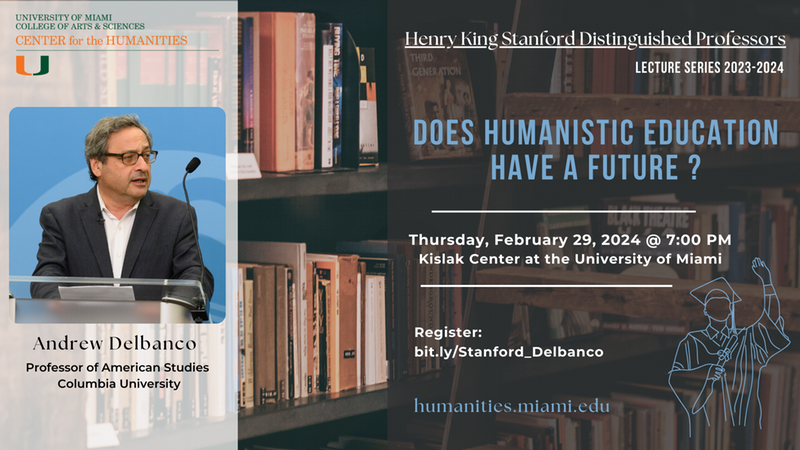
Thursday, February 29, 2024 @ 7:00 pm
Kislak Center at the University of Miami
Andrew Delbanco, Alexander Hamilton Professor of American Studies, Columbia University and President of the Teagle Foundation
The Center for the Humanities invites you to join us for the Henry King Stanford Distinguished Professors Lecture of the year with Andrew Delbanco.
Our colleges and universities confront many challenges-- financial, political, pedagogical--that threaten undergraduate education in the humanities. Through the study of history, literature, and philosophy, young people encounter perennial human problems, and with the help of teachers and peers, they may develop the imagination, empathy, and analytic skills needed for building a better future. In an age dominated by technology, ideology, and rancor, how can we ensure that humanistic education has a future?
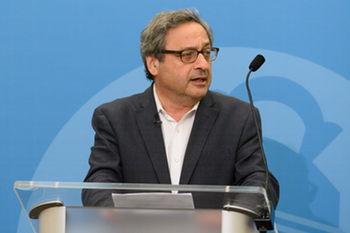 Andrew Delbanco, winner of the Great Teacher Award from the Society of Columbia Graduates, is the author of College: What it Was, Is, and Should Be (2012), Melville: His World and Work (2005), The Death of Satan (1995), Required Reading: Why Our American Classics Matter Now (1997), The Real American Dream (1999), and The Puritan Ordeal (1989), among other books. His work has been translated into several languages, including German, Spanish, Korean, Russian, and Chinese.
Andrew Delbanco, winner of the Great Teacher Award from the Society of Columbia Graduates, is the author of College: What it Was, Is, and Should Be (2012), Melville: His World and Work (2005), The Death of Satan (1995), Required Reading: Why Our American Classics Matter Now (1997), The Real American Dream (1999), and The Puritan Ordeal (1989), among other books. His work has been translated into several languages, including German, Spanish, Korean, Russian, and Chinese.
Professor Delbanco's essays appear regularly in The New York Review of Books and other journals, on topics ranging from American literary and religious history to contemporary issues in higher education. In 2001, he was named by Time Magazine as "America's Best Social Critic" and elected to the American Academy of Arts and Sciences. He is also an elected member of the American Philosophical Society, a trustee of the Teagle Foundation, the Library of America, and trustee emeritus of the National Humanities Center.
In February 2012, President Barack Obama presented Professor Delbanco with the National Humanities Medal for his writings on higher education and the place classic authors hold in history and contemporary life.










 Andrew Delbanco, winner of the Great Teacher Award from the Society of Columbia Graduates, is the author of College: What it Was, Is, and Should Be (2012), Melville: His World and Work (2005), The Death of Satan (1995), Required Reading: Why Our American Classics Matter Now (1997), The Real American Dream (1999), and The Puritan Ordeal (1989), among other books. His work has been translated into several languages, including German, Spanish, Korean, Russian, and Chinese.
Andrew Delbanco, winner of the Great Teacher Award from the Society of Columbia Graduates, is the author of College: What it Was, Is, and Should Be (2012), Melville: His World and Work (2005), The Death of Satan (1995), Required Reading: Why Our American Classics Matter Now (1997), The Real American Dream (1999), and The Puritan Ordeal (1989), among other books. His work has been translated into several languages, including German, Spanish, Korean, Russian, and Chinese.